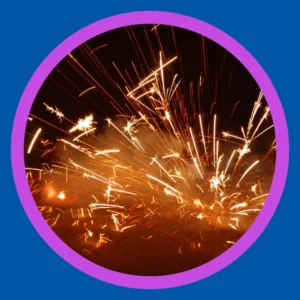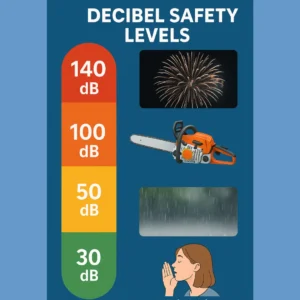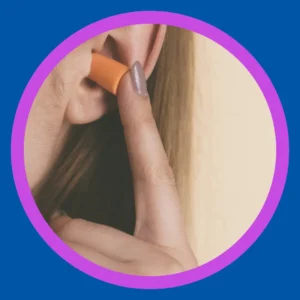Fireworks May Cause Hearing Damage
Summer celebrations and fireworks go hand-in-hand. But did you know fireworks can cause hearing damage in just one blast? It’s true—even short exposures to extremely loud sounds can harm your ears permanently.
At Stanford Hearing in Sioux Falls, we care deeply about your hearing health. That’s why we’re sharing the facts, risks, and protection strategies you need this July 4th and beyond.
Let’s explore how fireworks affect your hearing, what signs of damage to watch for, and what steps to take to protect yourself and your loved ones.
How Fireworks Cause Hearing Damage
Fireworks are more than dazzling—they’re dangerously loud. A single firework can reach 150–175 decibels (dB) at close range. For reference, that’s louder than a chainsaw, jet engine, or shotgun.
According to the National Institute on Deafness and Other Communication Disorders (NIDCD), sounds over 120 dB can cause immediate hearing damage. Fireworks exceed that by a lot.
Here’s what happens inside your ear:
- Sound waves hit your eardrum.
- Vibrations move through your middle ear bones.
- The cochlea in your inner ear receives those vibrations.
- Tiny hair cells inside the cochlea bend and send signals to your brain.
- Loud noises overwork or destroy these hair cells.
- Once they’re damaged, they don’t grow back.
That’s how one firework can lead to lifelong hearing issues.
Understand other causes of hearing impairment.

What Does Hearing Damage Feel Like?
Not all hearing damage is obvious. Some people feel it immediately. Others don’t notice it until later.
Watch for these common signs:
- Ringing or buzzing in the ears (tinnitus)
- Muffled or distorted sound
- A feeling of pressure or fullness in the ear
- Sensitivity to sound
- Trouble understanding speech, especially in noise
If these symptoms show up after fireworks, you’ve likely suffered some level of noise-induced hearing loss.
Temporary vs. Permanent Hearing Changes
Fireworks may cause either temporary threshold shifts or permanent hearing loss.
A temporary threshold shift:
- Makes things sound dull or muted
- Can last a few hours to a couple of days
- Happens when hair cells are stressed, not destroyed
Permanent hearing loss:
- Occurs with repeated loud noise exposure
- Causes irreversible damage to hair cells
- May lead to long-term tinnitus
Even if your hearing “comes back,” your ears may still have suffered damage. The risk increases every time you skip hearing protection.
Find out more about how healthy hearing helps with health aging.
Who Is Most at Risk?
Fireworks can harm anyone’s hearing, but these groups face greater danger:
- Infants and young children: Smaller ear canals amplify sound pressure.
- Teens: Already at risk due to headphone use and loud events.
- Older adults: Age-related hearing loss can worsen with fireworks exposure.
- People with hearing loss: Further damage can make symptoms worse.
The CDC estimates 24% of U.S. adults show signs of hearing loss caused by loud noise. Many don’t realize fireworks played a role.
Discover more about how noise causes hearing loss in millennials and Gen Z.

How Loud Are Fireworks Compared to Other Sounds?
To understand the risk, let’s compare:
- Whisper: 30 dB
- Normal conversation: 60 dB
- Lawnmower: 90 dB
- Rock concert: 110 dB
- Fireworks (close range): 150–175 dB
The World Health Organization recommends limiting noise to:
- 140 dB for adults
- 120 dB for children
Fireworks often exceed both limits—by a lot.
The Science Behind the Boom
Fireworks use gunpowder and other chemicals to create a controlled explosion. When lit:
- Gas rapidly expands
- It bursts from the firework shell
- The blast produces a shockwave
- That shockwave sends intense sound vibrations through the air
These vibrations can reach your ears faster than your brain can react. That’s why hearing damage can happen before you feel anything.

6 Simple Ways to Protect Your Hearing During Fireworks
Fireworks don’t have to hurt your ears. Follow these easy steps to enjoy the show and protect your hearing.
1. Skip the Home Fireworks
Personal fireworks may feel fun, but they’re not safe. Thousands of ER visits each year are due to home displays. Many involve hearing damage in kids.
Attend a local fireworks event instead. These are safer and offer clearly marked spectator zones for better sound protection.
2. Keep Your Distance
Every foot matters. The farther you are from the launch site, the lower the risk. A good rule: stay at least 500 feet away.
At this distance, the sound is still impressive—but far safer for your ears.
3. Wear Hearing Protection
Use these to block dangerous noise levels:
- Foam earplugs: Easy to find, cheap, and great for adults
- Earmuffs: Ideal for young kids and babies
- Double protection: Combine both for big displays or sensitive ears
Keep extras in your bag for friends and family. If it’s too loud, protect your ears.
4. Protect Babies and Toddlers
Infants should never be exposed to fireworks. Their ear canals are so small that even moderate sounds can feel 20 dB louder.
Stay home or keep your baby well indoors during fireworks shows.
5. Choose Quieter Fireworks
Planning a backyard display? Avoid loud options like:
- Rockets
- Firecrackers
- Salutes
- Repeaters
Instead, go for:
- Fountains
- Comets
- Wheels
- Falling leaves effects
These still sparkle—but with less sound pressure and fewer complaints from pets and neighbors.
6. Set an Example
Children learn by watching. If you wear hearing protection, they will too. Make it a tradition and part of your celebration.
Tinnitus After Fireworks: What It Is and How Long It Lasts
Tinnitus is that buzzing, ringing, or hissing in your ears after noise exposure. Fireworks are a common trigger.
How long does it last?
- A few hours: Most common
- 1–2 days: After bigger displays or close-range exposure
- Longer: May signal permanent damage
If ringing lasts more than three days, it’s time to see a professional.
What Helps Ears Recover After Fireworks?
If your ears feel off after the celebration, try these remedies:
- Rest in a quiet room
- Avoid loud music or headphones
- Take breaks from screen noise (TV, phone, etc.)
- Try calming techniques like deep breathing
- Use soft background noise (fans, white noise machines)
Still experiencing symptoms? Let Stanford Hearing help.
Learn about hearing aid insurance benefits.
When To See a Hearing Care Provider
You should get your hearing checked if:
- Ringing or buzzing doesn’t go away after 3 days
- You notice a sudden drop in hearing
- You feel pain, fullness, or pressure in your ears
- Your child seems to ignore sounds or responds oddly
We can assess any damage and recommend treatments or protective solutions.
Protect Your Hearing—Celebrate Smart
You don’t have to avoid fireworks. You just need a plan to enjoy them safely.
Here’s your checklist:
- Attend professional shows
- Keep 500+ feet from launch areas
- Wear earplugs or earmuffs
- Shield babies and young kids
- Choose quieter fireworks
- Watch for signs of hearing trouble
Stanford Hearing Is Here to Help
At Stanford Hearing, we’re passionate about protecting your hearing for life. Whether you’ve noticed a change after a celebration or want help choosing custom earplugs, our caring team is ready.
We offer:
- Complete hearing evaluations
- Tinnitus support and relief options
- Custom-fit ear protection for concerts and fireworks
- Personalized hearing care right here in Sioux Falls
Contact Stanford Hearing today and schedule your visit. Let’s keep your ears safe, sound, and celebration-ready!
